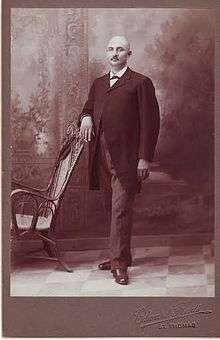Christopher Payne
| Christopher H. Payne | |
|---|---|
 | |
| Born |
September 7, 1845 Monroe County, West Virginia, U.S. |
| Died |
December 5, 1925 (aged 80) Virgin Islands |
| Occupation | minister, journalist, politician |
| Political party | Republican |
| Religion | Baptist |
Christopher Harrison (C.H.) Payne (1845–1925) was a prominent African-American religious, educational and political leader of the late nineteenth and early twentieth centuries. Despite being born in the American South during the time of slavery, Payne rose to a level of prominence achieved by few, regardless of race. Among his many accomplishments was being the first African American elected to the West Virginia Legislature.[1]
Early life
Payne was born in Monroe County, Virginia (now West Virginia) on September 7, 1845. His parents, both of whom were by then free blacks, were Thomas Payne and Barsheba Ellison. He was their only child. Thomas Payne, a cattle drover, died of smallpox when his son was two years old. His maternal grandfather was the slaveholder James Ellison who had Barsheba with his slave Fanny. Ellison made provisions in his will to free Fanny and Barsheba upon his wife's death. He also taught Barsheba to read and write. Payne's mother in turn taught him to read and write at a very early age. Education would remain a guiding tenent of the Payne family.[2]
During the American Civil War, Payne was forced to serve as an orderly in the Confederate Army. He was able to return home in 1864[2] and begin formal education for the first time after the war by attending night school while working as a farmhand during the day. He received a teaching certificate in 1868, becoming one of the first black teachers in Summers County, West Virginia. He continued to teach and farm until 1875, when he was baptized. He was licensed to preach in February 1876 and in May 1877 was ordained as a Baptist minister.[2]
Religious leader
Following Payne's ordination, he founded the Second Baptist Church in Hinton, West Virginia. He pastored many other churches and was said to have delivered over 1,500 sermons and converted 500 people.[3] He graduated from the Richmond Theological Institute in 1883[2] and State University, now the Virginia Union University. Payne presided over the West Virginia Baptist state convention for 16 years. On several occasions, he spoke at the national assemblies of white Baptists.
Newspaper publisher
Payne established three newspapers in West Virginia. They were the West Virginia Enterprise,[2] The Pioneer and Mountain Eagle. When founded, the West Virginia Enterprise was the only black newspaper in West Virginia. He was also a correspondent for other journals, including those geared for the white community. Payne used these venues to pursue equality between the races as well as to encourage other blacks to better themselves through education and the purchase of their own land and homes.
Politician
Payne's growing stature within both the black and white communities led to his appointment as an alternate delegate to the 1884 Republican national convention. He would serve as a regular delegate to the Republican national convention in 1888, where Benjamin Harrison was nominated for President of the United States. State leaders pushed for Payne's appointment as Ambassador to Liberia. Instead, he was appointed Deputy Collector for the United States Internal Revenue Service in Charleston, West Virginia. In 1896, Payne was elected to the West Virginia legislature, becoming the first black to serve in that elective body.
Along with Byrd Prillerman, another prominent African American, Payne was able to persuade the West Virginia Legislature to establish the West Virginia Colored Institute, now West Virginia State University, in 1891.[4]
During the Spanish–American War of 1898, Payne raised a volunteer black regiment and saw to their arrival at the war time encampment of Camp Atkinson.[5]
Attorney
Payne studied law and was admitted to the West Virginia bar in 1889, becoming one of the first black lawyers in West Virginia.[6]
Ambassador
Due to his faithful service to the Republican party, United States President Theodore Roosevelt named Payne as Consul General to the Danish West Indies in 1903, a very rare appointment for an African American at that time.[7]
Family life
Payne, married Ann Delilah Hargo at a young age and they had eight children. His youngest son and namesake, Christopher Hansen Payne (1881–1914), graduated from Howard University and received a medical degree. He practiced medicine in Hinton, West Virginia, until his early death in 1914.
Children of Christopher Payne:
- Arabella Geneva Payne, 1860–1930
- Lewis W. Payne, 1862–1927
- Martha Adelaide Payne, 1866–1944
- Mary Jane Payne, 1869–1932
- James Robert Payne, 1872–1943
- Charles Henry Payne, 1874–1950
- Cyrus Alexander Payne, 1877–1944
- Christopher Hansen Payne, 1881–1914
Later life
Payne remained in the Danish West Indies after they were sold to the United States in 1917 and became the United States Virgin Islands. With the closing of the consulate, he then became prosecuting attorney and police judge in St. Thomas, capital of the Virgin Islands. He died in the Virgin Islands on December 5, 1925, at the age of eighty.[8]
References
- ↑ "Christopher Payne". Wvculture.org. 1925-12-05. Retrieved 2012-06-09.
- 1 2 3 4 5 Simmons, William J., and Henry McNeal Turner. Men of Mark: Eminent, Progressive and Rising. GM Rewell & Company, 1887. p368-373
- ↑ Fuller, Louis (1976). Appointment at Armageddon: Muckraking and Progressivism in the American Tradition. Westport: Greenwood Press. p. 134. ISBN 0-8371-8261-1.
- ↑ "Byrd Prillerman". Wvculture.org. 1921-07-09. Retrieved 2012-06-09.
- ↑ "Spanish-American War: 2nd Regiment West Virginia Infantry". Wvculture.org. Retrieved 2012-06-09.
- ↑ http://www.jrclifford.org/Black%20Lawyers.htm
- ↑ "Friend Of Race". Afrigeneas.com. Retrieved 2012-06-09.
- ↑ Lawrence Kestenbaum. "Index to Politicians: Payne to Payrow". The Political Graveyard. Retrieved 2012-06-09.